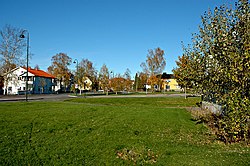Spydeberg was a municipality in former Østfold county, Norway, until December 31. 2019. At January 1. 2020 it became a part of the new and greater municipality named Indre Østfold Kommune after the region, together with Askim and Trøgstad and Eidsberg and Hobøl kommuner (municipalities).
Spydeberg Municipality
Spydeberg kommune | |
|---|---|
 | |
|
| |
 Østfold within Norway | |
 Spydeberg within Østfold | |
| Coordinates: 59°36′55″N 11°4′35″E / 59.61528°N 11.07639°E | |
| Country | Norway |
| County | Østfold |
| Administrative centre | Spydeberg |
| Area (upon dissolution) | |
| • Total | 142 km2 (55 sq mi) |
| • Land | 133 km2 (51 sq mi) |
| • Rank | #362 in Norway |
| Population (2004) | |
| • Total | 5,186 |
| • Rank | #201 in Norway |
| • Density | 35/km2 (90/sq mi) |
| • Change (10 years) | |
| Demonym | Speberging[1] |
| Official language | |
| • Norwegian form | Bokmål |
| Time zone | UTC+01:00 (CET) |
| • Summer (DST) | UTC+02:00 (CEST) |
| ISO 3166 code | NO-0123[3] |
| Website | Official website |
The administrative centre of the Spydeberg municipality was the village of Spydeberg. Spydeberg Kommune (municipality) was divided into the parishes of Spydeberg, Heli, and Hovin and was established as a municipality on 1 January 1838 (see formannskapsdistrikt).
The village of Spydeberg has approximately 5,500 inhabitants. It is located 45 kilometres (28 mi) southeast of Oslo and is easily reached by both car and bus and train. At the most there used to be 16 daily buses to Oslo (the capital of Norway), and about 21 train departures. Like the rest of the Indre Østfold region, many of the citizens of Spydeberg commute daily to Oslo for work.
General information
editName
editThe municipality (originally the parish) is named after the old Spydeberg farm (Old Norse: Spjótaberg), since the first church was built here. The first element is the plural genitive case of spjót which means 'spear' and the last element is berg which means 'mountain'. The word 'spear' is here probably referring to some outstanding points of a nearby mountain.
Coat-of-arms
editThe coat-of-arms is from modern times. They were granted on 30 June 1978. The arms show three canting silver spear points (from the word spyd which comes from the Old Norse word spjót) on a red background. The model for the spear points was unearthed at a burial mound near Mørk in 1905. The three spears represent the three parishes in the municipality. It was designed by Truls Nygaard.[4][5]
| Ancestry | Number |
|---|---|
| Poland | 84 |
| Lithuania | 61 |
| Syria | 48 |
| Eritrea | 44 |
| Myanmar | 44 |
| Sweden | 36 |
| Denmark | 34 |
Notable residents
editSister cities
editThe municipality of Spydeberg has been quite active in international relations for over 20 years. The town has sister cities in Denmark, Sweden, and Latvia.[7]
References
edit- ^ "Navn på steder og personer: Innbyggjarnamn" (in Norwegian). Språkrådet.
- ^ "Forskrift om målvedtak i kommunar og fylkeskommunar" (in Norwegian). Lovdata.no.
- ^ Bolstad, Erik; Thorsnæs, Geir, eds. (2023-01-26). "Kommunenummer". Store norske leksikon (in Norwegian). Kunnskapsforlaget.
- ^ Norske Kommunevåpen (1990). "Nye kommunevåbener i Norden". Retrieved 2008-12-15.
- ^ "Spydebergs kommunevåpen" (in Norwegian). Spydeberg kommune. Retrieved 2008-12-15.
- ^ "Immigrants and Norwegian-born to immigrant parents, by immigration category, country background and percentages of the population". ssb.no. Retrieved 24 June 2017.
- ^ "Spydebergs vennskapskommuner" (in Norwegian). Spydeberg kommune. Archived from the original on 2012-02-19. Retrieved 2008-12-15.
External links
edit- Media related to Spydeberg at Wikimedia Commons
- Østfold travel guide from Wikivoyage
- The dictionary definition of Spydeberg at Wiktionary
- Municipal fact sheet from Statistics Norway

